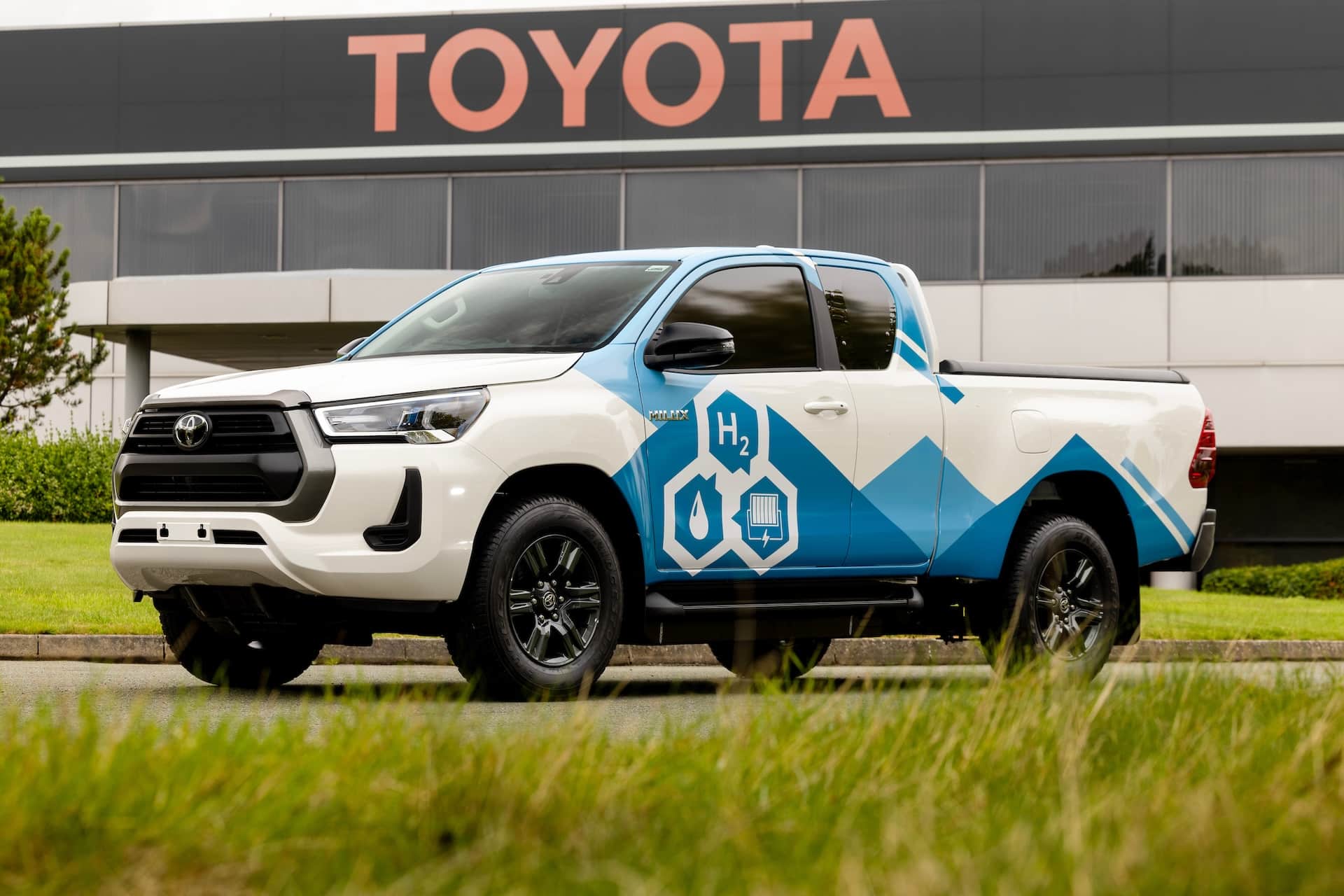Toyota has recently revealed a hydrogen fuel cell electric prototype of its famous Hilux pickup truck. The prototype was launched at Toyota Manufacturing UK’s vehicle plant in Derby, England, with funding from the UK Government. This development is in line with Toyota’s comprehensive European strategy to accelerate the progress of hydrogen fuel cell solutions and achieve carbon neutrality in the region.
The introduction of the hydrogen fuel cell electric Hilux prototype is a significant milestone in Toyota’s multi-path strategy towards a zero-carbon future. This strategy includes a range of powertrain options such as hybrid electric, plug-in hybrid electric, battery electric, and now fuel cell electric, to cater to different consumer needs and global operating conditions. As a well-known name in the pickup truck segment, the Hilux’s transition to zero-emission powertrains could potentially influence the broader automotive market.
The prototype utilizes core technology from the Toyota Mirai hydrogen fuel cell sedan, which has demonstrated commercial viability for almost a decade. The hydrogen fuel cells in the prototype produce zero tailpipe emissions, emitting only pure water. Additionally, three high-pressure fuel tanks store the hydrogen, providing an expected range of over 600 km, surpassing the capabilities of most battery-electric vehicles. The prototype also features a hybrid battery located in the rear load deck, which stores electricity generated by the fuel cell without compromising cabin space.
The hydrogen fuel cell electric Hilux prototype is the result of a focused design and development program that began in early 2022. Supported by a consortium of key partners and UK Government funding through the Advanced Propulsion Centre, the project serves as an experimental platform for Toyota and its partners to refine their skills in fuel cell electrification and hydrogen systems. Rigorous testing is scheduled for these prototypes to ensure they meet the necessary standards for a production model. Decisions regarding potential mass production are expected to be made in the latter half of this decade.
The consortium members involved in the project include Toyota Motor Manufacturing UK (TMUK), which leads the project and has been a pioneer in hybrid electric vehicle manufacturing outside Japan since 1992. Ricardo, a global engineering and environmental consultancy, has played a crucial role in integrating the fuel cell components. ETL (European Thermodynamics) specializes in thermal solutions and has contributed its design and innovation expertise. D2H Advanced Technologies has provided valuable engineering services, and Thatcham Research has supported sustainable repair consultancy and hydrogen training for the repair market.
Overall, the unveiling of the hydrogen fuel cell electric Hilux prototype showcases Toyota’s commitment to advancing sustainable mobility solutions. With its proven technology and range capabilities, this prototype could potentially pave the way for the widespread adoption of hydrogen fuel cell vehicles in the automotive industry.
Source: [Toyota reveals hydrogen fuel cell electric Hilux prototype](https://newsroom.toyota.eu/toyota-reveals-hydrogen-fuel-cell-electric-hilux-prototype/)
Toyota reveals prototype of Hilux powered by hydrogen
Toyota, the leading automobile manufacturer renowned for its commitment to green technology and sustainable mobility solutions, has recently unveiled a groundbreaking prototype of its popular pickup truck, the Hilux, powered by hydrogen fuel cell technology. With sustainability at the core of its mission, Toyota continues to push the boundaries of innovation to offer eco-friendly alternatives to conventional gasoline-powered vehicles.
The new Hilux prototype marks a significant step forward in Toyota’s long-standing efforts to explore hydrogen as a clean and efficient energy source for transportation. Hydrogen fuel cell technology has gained substantial attention in recent years due to its potential to revolutionize the transportation sector by reducing greenhouse gas emissions and eliminating reliance on fossil fuels. Toyota’s prototype represents a tangible manifestation of their commitment to harnessing the power of hydrogen.
The Hilux, renowned for its durability, versatility, and off-road capabilities, has long been a favorite among pickup truck enthusiasts. Toyota’s decision to incorporate the Hilux into their hydrogen fleet demonstrates their dedication to offering sustainable options across a wide range of vehicle types. This move also aims to dispel the common misconception that hydrogen fuel cell technology is only suitable for smaller vehicles or sedans.
One of the major advantages of the hydrogen-powered Hilux is its impressive range. Unlike battery-electric vehicles, the Hilux can travel considerably longer distances without requiring time-consuming recharging. This ability eliminates “range anxiety” commonly associated with electric vehicles and makes hydrogen a viable alternative for consumers who prioritize long-distance travel or frequently transport heavy loads.
Another notable advantage of hydrogen fuel cell technology is its environmental friendliness. The only byproduct of a hydrogen fuel cell is water, making it a zero-emission option. This is desirable for both individual consumers concerned about their carbon footprint and governments striving to meet increasingly stringent emission standards. By adopting this technology in a pickup truck, Toyota is broadening the scope of its green initiatives and encouraging other manufacturers to explore the potential of hydrogen in larger vehicles.
While hydrogen-powered vehicles have not yet reached mainstream popularity due to limited hydrogen refueling infrastructure, Toyota’s commitment to advancing clean transportation solutions is a catalyst for change. The company has actively collaborated with governments, research institutions, and industry partners to promote the development of hydrogen infrastructure, fostering a supportive ecosystem for the widespread adoption of this energy source.
Toyota’s prototype of the hydrogen-powered Hilux represents a major leap forward in sustainable transportation. By combining the popular pickup truck with cutting-edge technology, Toyota is broadening the horizons of clean mobility and demonstrating the versatility of hydrogen fuel cells. As the world increasingly recognizes the urgency of combating climate change, Toyota’s propulsion towards eco-friendly solutions reinforces its position as a frontrunner in the automotive industry.
In conclusion, Toyota’s prototype of the Hilux powered by hydrogen fuel cell technology represents a significant step towards a greener future. By incorporating sustainable alternatives throughout its vehicle lineup, Toyota is setting a commendable example for other manufacturers. While challenges remain in terms of infrastructure and general consumer adoption, Toyota’s commitment to hydrogen-based transportation paves the way for future advancements in clean and efficient mobility solutions.

